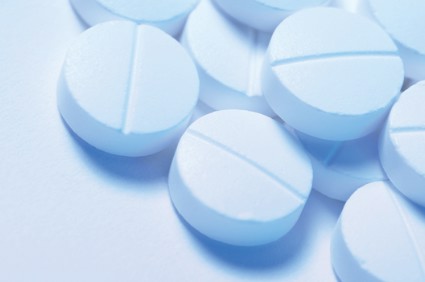User login
SAN DIEGO – Three days of acetaminophen seemed to lower creatinine levels in severely septic patients, suggesting a renoprotective effect, according to results from a phase II study out of Vanderbilt University in Nashville, Tenn.
Investigators there randomized 18 septic ICU patients to acetaminophen 1 g every 6 hours for 3 days and 22 patients to placebo, both delivered by mouth or feeding tube. The patients had all been in the ICU for less than 24 hours, and had detectable levels of plasma cell-free hemoglobin (CFH).
The findings were presented at an international conference of the American Thoracic Society.
CFH has been associated with death in a number of conditions. The iron separates, radicalizes, and causes oxidative injury, especially to the kidneys. Acetaminophen chemically reduces the iron, and has been shown to counter the harm.
In an earlier observational study, the Vanderbilt team found that detectible CFH is common in ICU sepsis patients, as well as elevated plasma levels of F2-isoprostanes, an indicator of oxidative injury. They also observed that CFH was associated with death, and that exposure to acetaminophen seemed to reduce F2-isoprostanes levels and improve survival (Crit Care Med. 2013;41:784-90).
The findings prompted the phase II investigation. The team found that the acetaminophen group had lower levels of F2-isoprostanes on study day 2 (mean 24.9 pg/mL vs. 41.2 pg/mL) and lower levels of serum creatinine on study day 3 (mean 1.0 mg/dL vs. 1.3 mg/dL). These differences were significant and the renal benefit persisted throughout hospitalization.
Acetaminophen patients overall started with a lower mean baseline creatinine level (1.63 mg/dL vs. 2.06 mg/dL), so the investigators reran their analysis, excluding patients on renal replacement therapy. "The baseline imbalance went away, and the story remained the same: There was still a significant decrease in serum creatinine in the acetaminophen group," said lead investigator Dr. David Janz, a critical care fellow at Vanderbilt.
Despite a favorable trend, acetaminophen did not significantly improve survival, a secondary outcome; one (5.6%) acetaminophen and four (18.2%) placebo patients died.
Still, the results are strong enough to suggest that acetaminophen might one day prove to be "a potent intervention to improve sepsis outcomes. Even small creatinine changes are associated with increased length of stay and mortality," Dr. Janz said.
"Our trial contains some negative results" – most notably no significant effect on day 3 F2-isoprostanes levels – but "the consistent reduction in creatinine across a number of different analyses and the biologic plausibility underlying this signal prompt further investigation. We need larger studies that focus on length of stay and mortality," he said.
Acetaminophen patients were slightly younger (50 vs. 58 years), but besides that and the baseline creatinine difference, the groups were well matched. Both had mean Apache II scores in the low 20s. Nine acetaminophen patients (50%) and seven placebo patients (32%) were intubated.
Both groups received a median of 12 study doses. There was no statistical between-group difference in the number of patients whose AST/ALT topped 400 U/L, a stop-point hit by two acetaminophen patients and one placebo patient. No one in the acetaminophen group developed a rash.
Patients who had liver disease or who had gotten acetaminophen within 48 hours were among those excluded from the study.
The work was funded by the National Institutes of Health and the American Heart Association. Dr. Janz had no disclosures.
Dr. Eleanor Summerhill, FCCP, comments: This small, phase II randomized, double-blind, placebo-controlled pilot study suggests that acetaminophen may play a future therapeutic role in the amelioration of oxidative injury–induced multisystem organ failure. Clearly, more investigation is necessary.
The study was small, so despite randomization, there were differences in the two treatment groups in regard to age and baseline creatinine levels (the latter corrected for in a secondary analysis). In addition, the effect on oxidative injury markers was not robust beyond day 2. Finally, the study was underpowered for important outcomes such as hospital length of stay and mortality.
The current study adds to the body of literature demonstrating that acetaminophen inhibits hemoprotein-mediated lipid peroxidation in vitro and in animal models. It also builds upon a previous observational study showing that high plasma cell-free hemoglobin concentrations were associated with poor outcomes in sepsis, and that acetaminophen decreased serum markers of oxidative stress as well as mortality.
Dr. Eleanor Summerhill, FCCP, comments: This small, phase II randomized, double-blind, placebo-controlled pilot study suggests that acetaminophen may play a future therapeutic role in the amelioration of oxidative injury–induced multisystem organ failure. Clearly, more investigation is necessary.
The study was small, so despite randomization, there were differences in the two treatment groups in regard to age and baseline creatinine levels (the latter corrected for in a secondary analysis). In addition, the effect on oxidative injury markers was not robust beyond day 2. Finally, the study was underpowered for important outcomes such as hospital length of stay and mortality.
The current study adds to the body of literature demonstrating that acetaminophen inhibits hemoprotein-mediated lipid peroxidation in vitro and in animal models. It also builds upon a previous observational study showing that high plasma cell-free hemoglobin concentrations were associated with poor outcomes in sepsis, and that acetaminophen decreased serum markers of oxidative stress as well as mortality.
Dr. Eleanor Summerhill, FCCP, comments: This small, phase II randomized, double-blind, placebo-controlled pilot study suggests that acetaminophen may play a future therapeutic role in the amelioration of oxidative injury–induced multisystem organ failure. Clearly, more investigation is necessary.
The study was small, so despite randomization, there were differences in the two treatment groups in regard to age and baseline creatinine levels (the latter corrected for in a secondary analysis). In addition, the effect on oxidative injury markers was not robust beyond day 2. Finally, the study was underpowered for important outcomes such as hospital length of stay and mortality.
The current study adds to the body of literature demonstrating that acetaminophen inhibits hemoprotein-mediated lipid peroxidation in vitro and in animal models. It also builds upon a previous observational study showing that high plasma cell-free hemoglobin concentrations were associated with poor outcomes in sepsis, and that acetaminophen decreased serum markers of oxidative stress as well as mortality.
SAN DIEGO – Three days of acetaminophen seemed to lower creatinine levels in severely septic patients, suggesting a renoprotective effect, according to results from a phase II study out of Vanderbilt University in Nashville, Tenn.
Investigators there randomized 18 septic ICU patients to acetaminophen 1 g every 6 hours for 3 days and 22 patients to placebo, both delivered by mouth or feeding tube. The patients had all been in the ICU for less than 24 hours, and had detectable levels of plasma cell-free hemoglobin (CFH).
The findings were presented at an international conference of the American Thoracic Society.
CFH has been associated with death in a number of conditions. The iron separates, radicalizes, and causes oxidative injury, especially to the kidneys. Acetaminophen chemically reduces the iron, and has been shown to counter the harm.
In an earlier observational study, the Vanderbilt team found that detectible CFH is common in ICU sepsis patients, as well as elevated plasma levels of F2-isoprostanes, an indicator of oxidative injury. They also observed that CFH was associated with death, and that exposure to acetaminophen seemed to reduce F2-isoprostanes levels and improve survival (Crit Care Med. 2013;41:784-90).
The findings prompted the phase II investigation. The team found that the acetaminophen group had lower levels of F2-isoprostanes on study day 2 (mean 24.9 pg/mL vs. 41.2 pg/mL) and lower levels of serum creatinine on study day 3 (mean 1.0 mg/dL vs. 1.3 mg/dL). These differences were significant and the renal benefit persisted throughout hospitalization.
Acetaminophen patients overall started with a lower mean baseline creatinine level (1.63 mg/dL vs. 2.06 mg/dL), so the investigators reran their analysis, excluding patients on renal replacement therapy. "The baseline imbalance went away, and the story remained the same: There was still a significant decrease in serum creatinine in the acetaminophen group," said lead investigator Dr. David Janz, a critical care fellow at Vanderbilt.
Despite a favorable trend, acetaminophen did not significantly improve survival, a secondary outcome; one (5.6%) acetaminophen and four (18.2%) placebo patients died.
Still, the results are strong enough to suggest that acetaminophen might one day prove to be "a potent intervention to improve sepsis outcomes. Even small creatinine changes are associated with increased length of stay and mortality," Dr. Janz said.
"Our trial contains some negative results" – most notably no significant effect on day 3 F2-isoprostanes levels – but "the consistent reduction in creatinine across a number of different analyses and the biologic plausibility underlying this signal prompt further investigation. We need larger studies that focus on length of stay and mortality," he said.
Acetaminophen patients were slightly younger (50 vs. 58 years), but besides that and the baseline creatinine difference, the groups were well matched. Both had mean Apache II scores in the low 20s. Nine acetaminophen patients (50%) and seven placebo patients (32%) were intubated.
Both groups received a median of 12 study doses. There was no statistical between-group difference in the number of patients whose AST/ALT topped 400 U/L, a stop-point hit by two acetaminophen patients and one placebo patient. No one in the acetaminophen group developed a rash.
Patients who had liver disease or who had gotten acetaminophen within 48 hours were among those excluded from the study.
The work was funded by the National Institutes of Health and the American Heart Association. Dr. Janz had no disclosures.
SAN DIEGO – Three days of acetaminophen seemed to lower creatinine levels in severely septic patients, suggesting a renoprotective effect, according to results from a phase II study out of Vanderbilt University in Nashville, Tenn.
Investigators there randomized 18 septic ICU patients to acetaminophen 1 g every 6 hours for 3 days and 22 patients to placebo, both delivered by mouth or feeding tube. The patients had all been in the ICU for less than 24 hours, and had detectable levels of plasma cell-free hemoglobin (CFH).
The findings were presented at an international conference of the American Thoracic Society.
CFH has been associated with death in a number of conditions. The iron separates, radicalizes, and causes oxidative injury, especially to the kidneys. Acetaminophen chemically reduces the iron, and has been shown to counter the harm.
In an earlier observational study, the Vanderbilt team found that detectible CFH is common in ICU sepsis patients, as well as elevated plasma levels of F2-isoprostanes, an indicator of oxidative injury. They also observed that CFH was associated with death, and that exposure to acetaminophen seemed to reduce F2-isoprostanes levels and improve survival (Crit Care Med. 2013;41:784-90).
The findings prompted the phase II investigation. The team found that the acetaminophen group had lower levels of F2-isoprostanes on study day 2 (mean 24.9 pg/mL vs. 41.2 pg/mL) and lower levels of serum creatinine on study day 3 (mean 1.0 mg/dL vs. 1.3 mg/dL). These differences were significant and the renal benefit persisted throughout hospitalization.
Acetaminophen patients overall started with a lower mean baseline creatinine level (1.63 mg/dL vs. 2.06 mg/dL), so the investigators reran their analysis, excluding patients on renal replacement therapy. "The baseline imbalance went away, and the story remained the same: There was still a significant decrease in serum creatinine in the acetaminophen group," said lead investigator Dr. David Janz, a critical care fellow at Vanderbilt.
Despite a favorable trend, acetaminophen did not significantly improve survival, a secondary outcome; one (5.6%) acetaminophen and four (18.2%) placebo patients died.
Still, the results are strong enough to suggest that acetaminophen might one day prove to be "a potent intervention to improve sepsis outcomes. Even small creatinine changes are associated with increased length of stay and mortality," Dr. Janz said.
"Our trial contains some negative results" – most notably no significant effect on day 3 F2-isoprostanes levels – but "the consistent reduction in creatinine across a number of different analyses and the biologic plausibility underlying this signal prompt further investigation. We need larger studies that focus on length of stay and mortality," he said.
Acetaminophen patients were slightly younger (50 vs. 58 years), but besides that and the baseline creatinine difference, the groups were well matched. Both had mean Apache II scores in the low 20s. Nine acetaminophen patients (50%) and seven placebo patients (32%) were intubated.
Both groups received a median of 12 study doses. There was no statistical between-group difference in the number of patients whose AST/ALT topped 400 U/L, a stop-point hit by two acetaminophen patients and one placebo patient. No one in the acetaminophen group developed a rash.
Patients who had liver disease or who had gotten acetaminophen within 48 hours were among those excluded from the study.
The work was funded by the National Institutes of Health and the American Heart Association. Dr. Janz had no disclosures.
Key clinical point: Acetaminophen might protect septic patients’ kidneys.
Major finding: After 3 days, 18 septic ICU patients randomized to acetaminophen had a mean serum creatinine of 1.0 mg/dL; 22 randomized to placebo had a mean serum creatinine of 1.3 mg/dL (P = .039).
Data source: A phase II trial.
Disclosures: The work was funded by the National Institutes of Health and the American Heart Association. The lead investigator had no disclosures.


